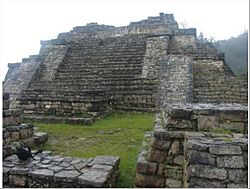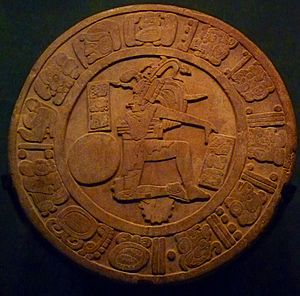Chinkultic facts for kids

Structure 1 (Acropolis)
|
|
| Location | Comitán, Chiapas, |
|---|---|
| Region | Chiapas |
| Coordinates | 16°7′34″N 91°47′0″W / 16.12611°N 91.78333°W |
| History | |
| Founded | 3rd century |
| Abandoned | 13th century |
| Cultures | Maya civilization |
| Site notes | |
| Archaeologists | Edward Seler, Enrique Juan Palacios |
Chinkultic (sometimes spelled Chincultic) is an ancient city built by the Maya people. You can find its ruins in the state of Chiapas, Mexico. It is located inside the beautiful Lagunas de Montebello National Park.
This old city was a busy place during the Maya Classic Era. This period lasted from about the 200s to the 800s AD. Most of the amazing stone carvings and writings (called hieroglyphs) found here were made between 591 and 897 AD. People continued to live at Chinkultic until the 1200s. After that, the city was finally left empty.
Contents
Exploring Chinkultic's Ancient Structures
Chinkultic has many interesting buildings to explore. You can see several step-pyramids. There are also about 200 smaller buildings. Most of these are still in their original, untouched state.
Stone Carvings and Rulers
The site has special carved stones called stelae. These stelae show pictures of the city's rulers. They also have hieroglyphic inscriptions. These are like ancient written messages. They tell us about important events and dates from the past.
The Ballgame Court
One exciting part of Chinkultic is its court for playing the Mesoamerican ballgame. This was a very important sport for the ancient Maya. A special marker at the court tells us it was officially opened on May 21, 591 AD.

Discovering Chinkultic
People have known about Chinkultic for a long time. The first written report about the site was made by Edward Seler. This was in the late 1800s. Later, in 1926, Enrique Juan Palacios wrote a very detailed description of the site.
Early Archeological Work
The first scientific studies of the site began in 1966. These were led by Stephan F. de Borhegyi. He was from the Public Museum of Milwaukee, Wisconsin.
Mexican Excavations and the Cenote
Starting in 1970, Mexican government archeologists did more digging and fixed up some buildings. They also explored a natural well at the site. This well is called a cenote. It is known as Agua Azul, which means "Blue Water." Archeologists found many old objects in this cenote. The name Chinkultic actually comes from the Maya language. It means "stepped-cenote," likely because of how the cenote looks.
Visiting Chinkultic Today
Today, Chinkultic is open for visitors. It's a great place to learn about the ancient Maya. While it's not as famous as some other Maya sites, it offers a unique look into their history.
See also
 In Spanish: Chinkultic para niños
In Spanish: Chinkultic para niños
 | Kyle Baker |
 | Joseph Yoakum |
 | Laura Wheeler Waring |
 | Henry Ossawa Tanner |


